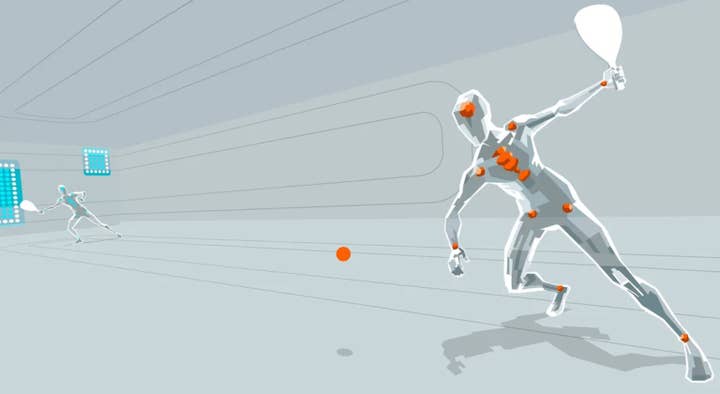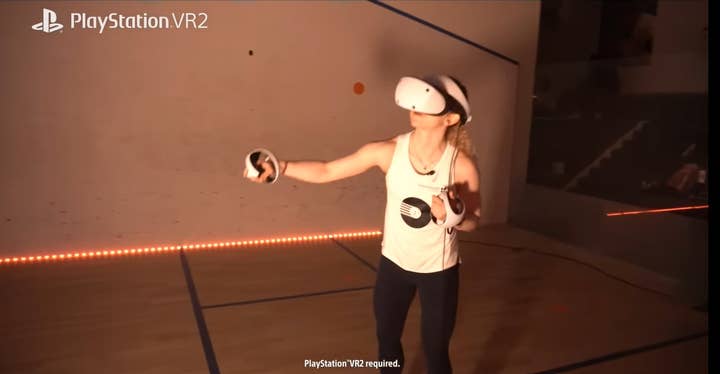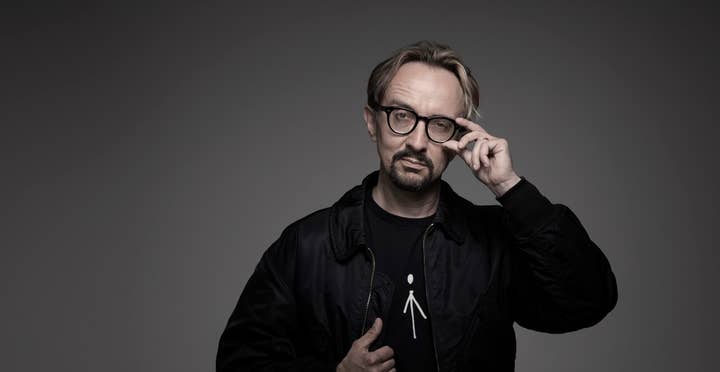Why is someone making a sequel to a forgotten Japan-only Dreamcast game?
We speak to publisher and developer RapidEyeMovers about the thinking behind C-Smash VRS
Sign up for the GI Daily here to get the biggest news straight to your inbox
If you ever owned a Sega Dreamcast, you'll know it as a console that did not deserve its fate.
An innovative machine that introduce the console world to online gaming, and home to such iconic games as Shenmue, Skies of Arcadia, Jet Set Radio, Phantasy Star Online, Soulcalibur Samba de Amigo, Sonic Adventure and Cosmic Smash.
Oh you've not heard of that last one? I'm not surprised. Sega's futuristic squash game was only released in Japan in September 2001… six months after the console was discontinued.
"The original Cosmic Smash deserved a global success. The Dreamcast itself deserved to have a much longer lifespan. It's the best console ever"
And yet here I am, speaking to Jörg Tittel, the director at RapidEyeMovers, who has decided to build a full sequel to Cosmic Smash in VR, under the name C-Smash VRS.
This isn't a spiritual successor, but a fully licensed follow-up to the Sega original.
"I used to write for the Official Dreamcast Magazine in the US," Tittel tells us.
"My Sega love and heritage is long. It's been a dream of mine. I think for Sega to even dedicate internal resources to talk to me about Cosmic Smash was a stretch. They have so many big licenses that are lucrative for them. I had to convince them as much as I was sure I'd have to convince the outside world that this is a thing that needs to exist.
"I'm proud and happy that I did. The original Cosmic Smash deserved a global success. The Dreamcast itself deserved to have a much longer lifespan. It's the best console ever. It's the one that not only created some of the most long lasting and most memorable games of all time, but it also invented the indie game dev scene of today.
"The way Cosmic Smash was made, the way Jet Set Radio was made, the way Tetsuya Mizuguchi formed United Game Artists at the time… it was a truly independent spirit. These people were left to their own devices. Every single game for the Dreamcast was made like this, which is why we have these incredibly fresh original things. That's what indies are."
"To me, games are about delight. When you play with your children… the thing that makes them laugh, makes them engaged, makes them play, is the element of surprise"
On the surface, C-Smash VRS doesn't sound like a good idea. A game based on a forgotten IP built specifically for a niche platform, it isn't what you'd call a guaranteed hit.
"The fact that it is obscure also makes it original and fresh, because no-one has seen it coming," Tittel suggests.
"To me, games are about delight. When you play with your children… the thing that makes them laugh, makes them engaged, makes them play, is the element of surprise. A joke will make you laugh because you didn't see it coming. A monster will scare you because you didn't know it was there. It was unexpected.
"That element of surprise is what makes things beautiful and special and fresh. When everything is already based on brands you already know and have already formed a very firm opinion on, you're killing a side of that delight that you could have from the onset.
"We're all living in this world where we're all playing familiar. Familiarity breeds contempt, as Shakespeare wrote, but I believe that familiarity breeds content. Content is boring. Everything is content now. We've decided to do things that will take you by surprise, but that will only ever come from a place of love and passion first, and the brand is second. That doesn't mean I'd never work with a big license. I might one day. But I would have to have such a fresh take on it that no-one would have ever thought of."

Regular readers of GamesIndustry.biz might recognise Tittel's name, because we only spoke to him a few weeks ago for the release of an entirely different game, the satirical adventure game The Last Worker. That game was built almost entirely during the pandemic, and features a cast that includes Jason Isaacs and Zelda Williams.
"We really started development about two months into the pandemic. It was crazy to be working on a game called The Last Worker while also working from home and feeling like the whole world was going to shit. Working with all of these incredible people on the game, being the only game in competition at the Venice Film Festival… that was amazing," Tittel explains.
"Right in the middle of all this, I thought if the world is going to end and I might die tomorrow, I want to make something else. It was that idea of mortality looming... I wanted to have a new company and I wanted to start something."
And so he started talking to Sega, and from the start it was always imagined as a VR game.
"To me, Sega was always a VR company," Tittel says. "Ever since I stepped into Out Run and my feet could barely reach the pedals because I was eight years old at the time, I was like this is a virtual reality experience.
"I want this to be the game that everyone thinks of when they think of VR"
"I was enjoying being in the VR space so much, I realised that I wanted to make a fully embodied experience. I wanted to have that holodeck experience which always seems to have been the promise of VR, but nothing has truly made me feel like this yet.
"In parallel, while working with Ryan Bousfield and his team Wolf & Wood [on the Last Worker], I approached Cory Schmitz and this incredible guy Dan Clarke also known as Arkotype. They both teamed up on the graphic design side. I brought my own art director, Rob Davis, on board, we started doing concepts and stuff. Then Sega granted me the rights. I went to Ryan and asked if he wanted to make this, and he was like: 'At the same time?' and I was like: 'Yeah' so he said alright. We have this term for it, Ryan and I, we call it infinite game jam. But because they're such different beasts to each other, this super involved narrative experience and then this reduced futuristic sports game, one felt like a vacation from the other."
C-Smash VRS is a futuristic squash-meets-Breakout game, with original music from techno DJ Ken Ishii (Rez Infinite) and synth player Danalogue (Comet is Coming). Players can step fully in the game using through PSVR 2 and even dance.
"It's about being physical, it's about being alive so it has to be in VR," Tittel says. "I want this to be the game that everyone thinks of when they think of VR.
"Games is the ultimate art form. It's the one that the majority spends the most time in. So how do we now make the most of that? How do we not just kill peoples' time with this endless content, but fill it with something that has meaning, that makes you feel good, that makes you meaningfully socialise with others. C-Smash is the beginning of that. You are in there with your whole body. We have people meeting up as full-body avatars and dancing with each other while they select the next level. That's what the spirit of games should be – it's positive, it's physical, it's spiritual."
The Last Worker was a game published by Wired Productions, but C-Smash VRS is a self-published game by Tittel's company RapidEyeMovers.
"If the intellectual work or passion cannot be communicated by the publisher fully, then there's no point"
"Traditional publishers have a place in the business. For a lot of developers who don't feel the need or don't feel comfortable communicating with the outside world, or they just want to focus on making games… that works. But, in some instances, a publisher is almost an expensive bank. If the intellectual work or passion cannot be communicated by the publisher fully, then there's no point. And I just thought: how hard can it be?
"The developer cares about every single bit of communication that comes out about a game anyway. You sweat over it, whether you write it yourself or someone else does, or whether you construct the trailer or someone else does, and you give notes. Ultimately, you still have to do it in some capacity.
"Also, I just want to do things differently. Games are culture and theatrical and entertainment. Games are the most meaningful social places to inhabit. I don't want to worry about feeding Steam algorithms and hiring a team of 12 people to figure out whether #poop might get you further up in the ranks. I want to develop meaningful relationships with the platforms, with people like PlayStation and Sega and Meta and everyone.
"We're just a group of people. You will know all of our names and you will know we are passionate. I like having a direct relationship with everyone, as both the creator, and producer, and director, and publisher of something, and gradually assemble people around you who can communicate that… that feels both more efficient and honest."

And one of those people is Lee Kirton, the former UK marketing director for Bandai Namco who is now at 4media group. And his marketing efforts have included holding physical events and teaming up with professional squash players.
"Lee is a theatrical person," Tittel says. "I come from theatre and film and to work with someone who thinks of everything when it comes to events, rather than metrics, is refreshing. People say it's so old school, we're doing an event to announce a game… That's so 2000. And I'm like: 'No, this is literally the only way we can stay relevant and reinforce the thing that games are a physical medium. They make us feel things."
He concludes: "That's why I called the company RapidEyeMovers because I want to move people. I want them to move physically, I want to move them emotionally and I want to release and distribute our games in ways that make people physically move their butts to a place and experience something.
"We've been stuck inside our fricking homes for three years. Games have always made me move places. In the beginning, it was going to some obscure arcade at the opposite side of town, where I'd be surrounded by all this cigarette smoke and have to peek over adults' shoulders to see Street Fighter. If we bring back that feeling of wanting to engage with our 'quote unquote content', then I think we'll win back that love, attention and passion that games deserve."
Sign up for the GI Daily here to get the biggest news straight to your inbox

